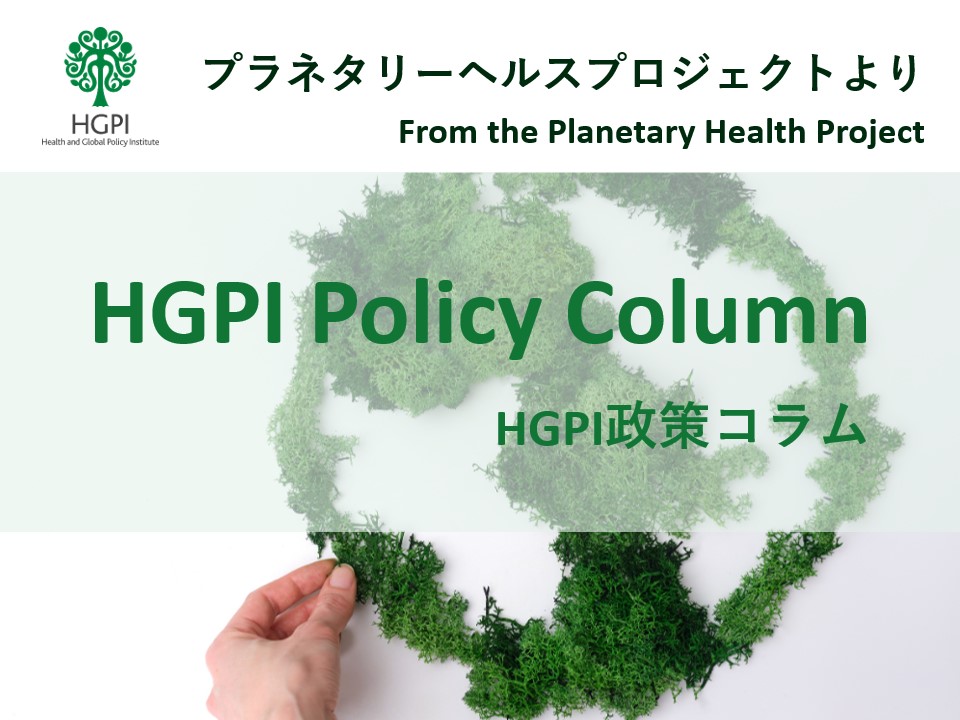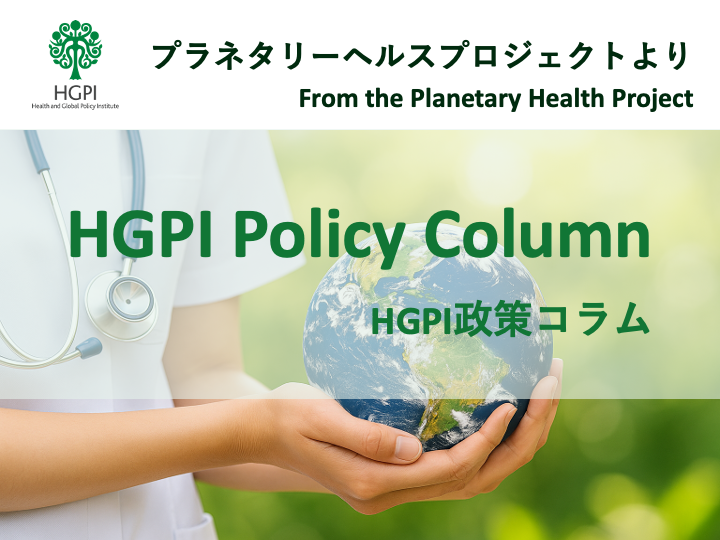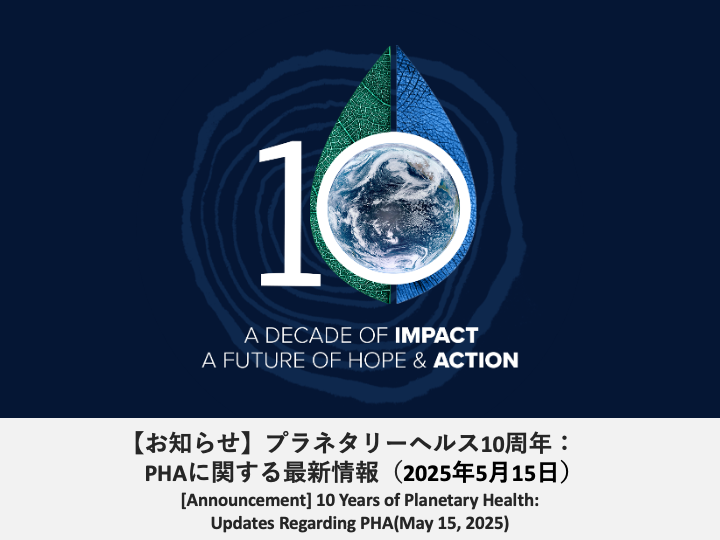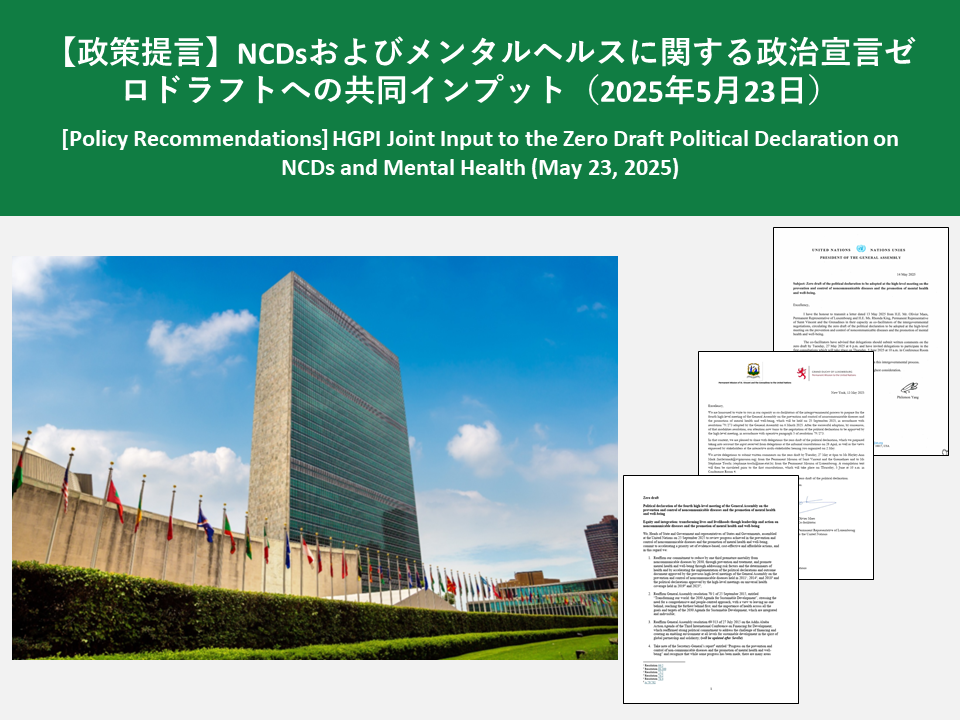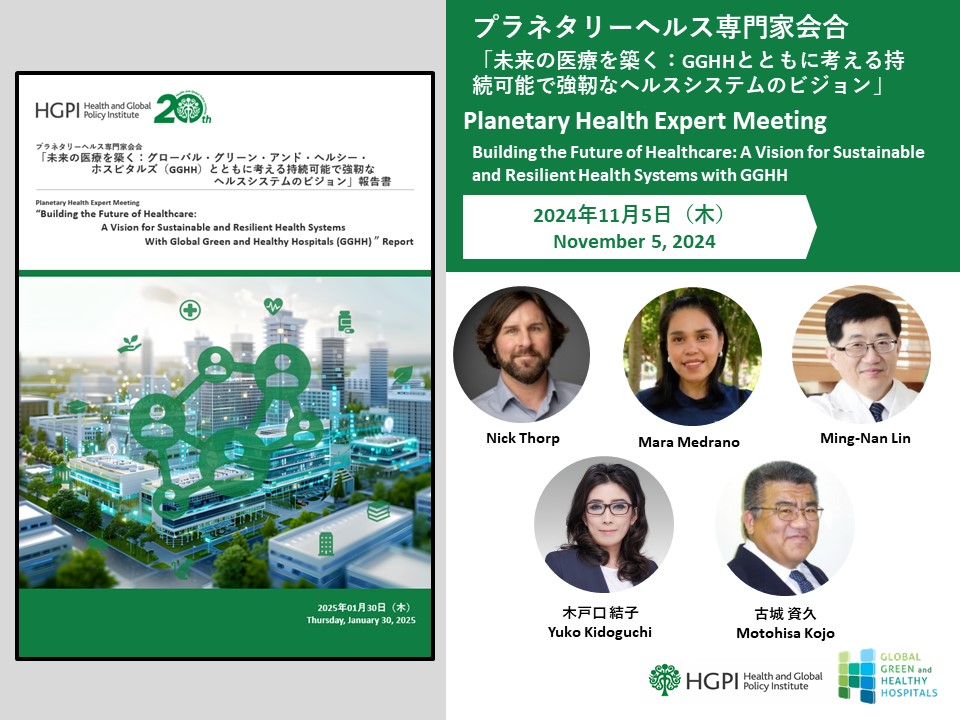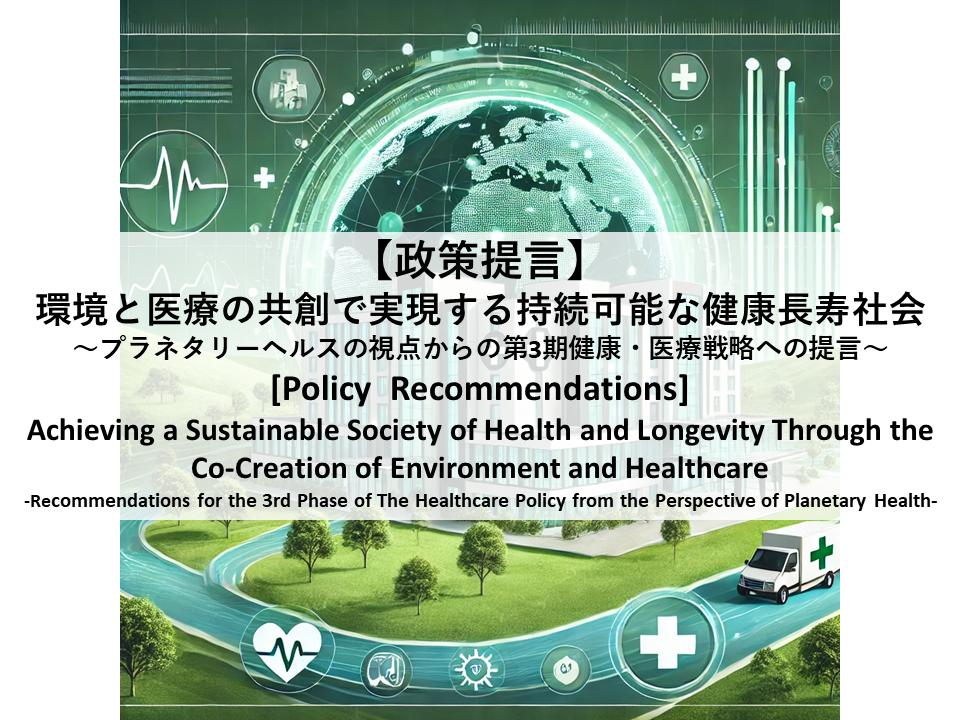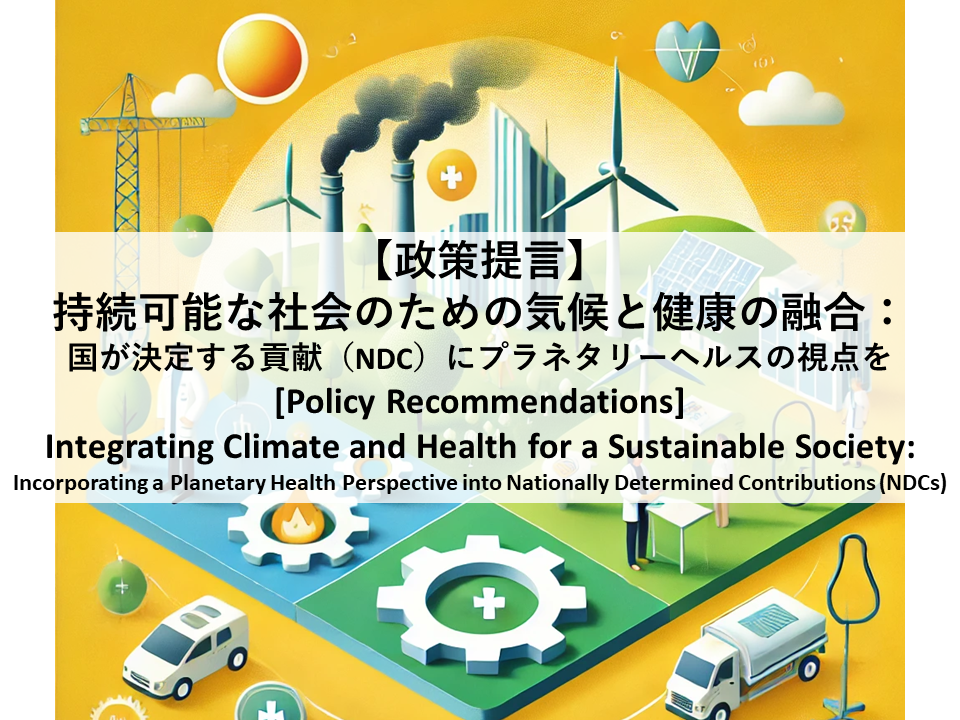[HGPI Policy Column] (No.61) — From the Planetary Health Project “Part 15: WHO’s Response to the Climate and Health Crisis: The Global Action Plan on Climate Change and Health”
date : 7/2/2025
![[HGPI Policy Column] (No.61) — From the Planetary Health Project “Part 15: WHO’s Response to the Climate and Health Crisis: The Global Action Plan on Climate Change and Health”](https://hgpi.org/en/wp-content/uploads/sites/2/HGPI_20250625_WHA78-column-61.png)
<POINTS>
- The World Health Organization (WHO) recognizes the climate crisis as a global health crisis, posing a major threat to public health and exacerbating inequalities, with current mitigation and adaptation efforts falling short
- Following the 77th World Health Assembly (WHA77), WHO started developing the Global Plan of Action (GPoA) on Climate Change and Health for consideration at the 78th World Health Assembly (WHA78). This plan was officially adopted at the end of WHA78, but not without opposition
- The GPoA focuses on action areas like leadership, evidence, and country-level action, drawing on frameworks such as Health in All Policies, One Health, and Planetary Health, guided by principles including equity, adaptability, and multisectoral partnerships
- As the GPoA moves towards implementation, its success will depend on the commitment of Member States, the WHO Secretariat, and all stakeholders to translate the plan’s objectives into concrete action and ensure that climate initiatives prioritize collective health outcomes for communities worldwide
- At WHA78, the Japanese government positioned climate change and health as global priorities and strongly supported the adoption and rapid implementation of the GPoA. Japan also emphasized that climate change and health is one of the critical global issues requiring concerted efforts from the international community and stated that the action plan should be adopted and put into practice given its urgency
Introduction
It is widely known that climate change threatens to undermine decades of progress in global health. The World Health Organization (WHO) has long acknowledged this link, with resolutions dating back to 2008. This year, the 78th World Health Assembly (WHA78) approved a historic decision: the adoption of the Global Action Plan (GPoA) on Climate Change and Health. This plan marks a significant shift from WHO’s traditionally adaptive responses to climate impacts towards a comprehensive strategy that embraces mitigation efforts with health co-benefits. This evolution reflects growing scientific consensus that climate action and health protection are inextricably linked and mutually reinforcing.
Development of the Global Action Plan
Formalized in resolution WHA77.14, the plan builds upon previous resolutions addressing air pollution and environmental health threats. Recognizing the need for a results-based, needs-oriented, and capabilities-driven plan, the GPoA was drafted coherent with the United Nations Framework Convention on Climate Change (UNFCCC) and the Paris Agreement. It aims to firmly integrate climate considerations across all levels of the WHO’s technical work and emphasize cross-sectoral cooperation. Its development involved extensive consultation with Member States, over 50 civil society stakeholders, and UN agencies, ensuring diverse perspectives informed its framework. This process also included engagement with countries from all WHO regions and levels of development, as well as the financing community and the private sector.
Specifically, the Japanese government at WHA78 explicitly demonstrated its strong support for the GPoA. Japan recognized the critical need to position climate change and health as global priorities and underscored the importance of the plan’s rapid adoption and implementation. The Japanese delegation highlighted the urgency of this challenge, stressing that it demands united efforts from the international community, and pledged active contributions to ensure the WHO-led action plan delivers concrete results. Japan’s leadership in this aspect is highly regarded by the international community as a key driver in generating global momentum for the GPoA.
Action Areas of the GPoA
The GPoA is structured around three primary action areas:
- Leadership, coordination, and advocacy: The WHO aims to integrate health considerations into climate policies at all levels. This includes supporting Member States in adopting “Health in All Policies” approaches and ensuring health is prioritized in multilateral climate forums.
- Evidence and monitoring: This will strengthen the scientific basis for decision-making, and includes developing and promoting robust research agendas, particularly in climate-vulnerable regions, and establishing integrated monitoring systems such as tools and integrated data systems to track progress.
- Country-level action and capacity-building: This action area focuses on translating global commitments into tangible results, ensuring that health systems are climate-resilient, low-carbon, and environmentally sustainable. This encompasses vulnerability assessments, developing national action plans that integrate health considerations into national climate plans, while also integrating climate considerations into national health policies, policies advocating for health system decarbonization, and implementation of early warning systems for climate-sensitive health threats.
| Actions | |||
| Action Area | Member States | WHO Secretariat | Stakeholders |
| Leadership, coordination, and advocacy | Support the plan’s implementation through mobilizing high-level attention to climate and health in multilateral forums, integrate health into climate policy processes and vice versa | Implementation, creation of cross-organizational mechanisms, coordination of UN bodies and civil society, promoting health in COP meetings, technical leadership | Support the plan’s implementation, strengthen partnerships, prioritize investments, advocacy building |
| Evidence and monitoring | Promote collaboration between policymakers and researchers, promote research on climate-sensitive environments, support integrated data systems | Synthesize evidence, provide guidance and tools, promote cross-border cooperation | Conduct and support research, contribute to priority setting, invest in local studies |
| Country-level action and capacity-building | Promotion of a One Health approach, implement policies on health system decarbonization, conduct assessments, develop national plans integrating health into climate policies (and vice versa), invest in adaptation measures (such as early warning systems), develop the health workforce | Technical guidance and capacity-building, facilitate access to financing, promotion of initiatives such as the Alliance for Transformative Action on Climate and Health (ATACH) | Multisectoral collaboration, civic society and community engagement, provide data, support training programs, advocacy building |
Key Challenges
During early discussions, the draft GPoA faced some resistance. Several developing countries felt the approach was too universal and did not adequately account for national differences. African nations, disproportionately impacted by climate change despite minimal historical emissions, emphasized that adaptation remained an absolute priority and sought greater focus on more substantial and accessible funding mechanisms to support climate-resilient health systems and infrastructure. China and other developing countries pushed for more emphasis on the principle of common but differentiated responsibilities and respective capabilities (CBDR-RC), arguing that asking developing country health sectors, which often have lower emissions, to “lead by example” on decarbonization targets without considering their capacity or relative emissions was contrary to this principle and could divert resources from core health functions.
At the 78th World Health Assembly, there was resistance to the plan primarily led by a cluster of oil-producing states, including Saudi Arabia, Russia, Egypt, and others from the Eastern Mediterranean Region. These countries pushed for delaying the plan’s adoption for another year, citing insufficient consultations and a need for better alignment with national contexts and diversity. However, these procedural objections masked deeper concerns about potential conflicts of interest. Critics questioned whether countries with substantial economic stakes in fossil fuel expansion could credibly oppose a plan promoting cleaner energy and emissions reduction—particularly given the established health co-benefits of such transitions.
Indeed, a significant point of criticism from civil society organizations like the Global Climate and Health Alliance (GCHA) has been the omission of any explicit mention of fossil fuels as the root cause of the climate crisis, despite it being a key public health imperative. GCHA highlighted that failing to address fossil fuels misses a crucial opportunity to emphasize their connection to health outcomes.
However, even with sustained opposition and delay tactics, the Global Plan of Action secured decisive approval. The final vote demonstrated remarkable international consensus: 109 member states voted for adoption, while primary opponents chose abstention over direct opposition.
This overwhelming support, with particularly strong backing from Africa, Europe, and Latin America, signals broad global recognition of WHO’s essential role in addressing climate change as a health issue. The outcome suggests that despite legitimate concerns about implementation details and resource allocation, the international community views climate-health integration as an urgent and necessary priority.
Practical Considerations
As the GPoA transitions from approval to implementation, success will depend on addressing several fundamental priorities:
- Integration of Health and Climate Agendas: A practical step is to ensure the health sector is meaningfully engaged in national climate change processes and to integrate climate considerations across health policy agendas, while also engaging environment and climate actors in health planning. This includes creating mechanisms to streamline the integration of health into national climate plans like Nationally Determined Contributions (NDCs) and National Adaptation Plans (NAPs).
- Resource and Financing: Financing mechanisms must be strengthened to ensure equitable implementation, particularly for vulnerable nations. This includes not only mobilizing additional resources but also streamlining access to existing climate funds. Evidence suggests that investing in climate-resilient health systems yields substantial returns—both economic and human. According to WHO analysis, the health benefits of meeting Paris Agreement targets would more than offset mitigation costs. This compelling case for investment should drive increased financial commitments from developed nations and multilateral institutions. Documenting the return on investment for climate-health interventions will also help mobilize resources and build political support.
- Specificity and Scope: Implementation guidance should be specific and actionable, with clear indicators to track progress and mechanisms to ensure accountability. Refining these indicators to reflect impact could strengthen the case for increased investment.
- Multi-sectoral Cooperation: Implementation requires promoting inter- and multisectoral cooperation between national health ministries and relevant authorities (environment, economy, nutrition, water, sustainable development), promoting a whole-of-government, whole-of-society, and One Health approach. There is a need for guidance on how health actors can effectively collaborate with partners from other sectors. Mechanisms on multi-sectoral cooperation must acknowledge the reality that health impacts cannot be addressed in isolation from broader climate policy.
- Capacity-building: Capacity-building efforts should prioritize regions facing the greatest climate-health risks, recognizing the disproportionate impacts on already-strained health systems. This includes training and education on the interdependence of climate change and health, conducting vulnerability assessments, and developing context-specific national strategies.
- Navigating Vested Interests: Stakeholders have advocated for the plan to explicitly reference the use of fossil fuels as a driver of the climate crisis and call for a just transition to renewable energy. Drawing lessons from tobacco and alcohol control frameworks, guidance on safeguarding policymaking from commercial and other vested interests would be needed to protect the integrity and ensure the effectiveness of the plan.
- Engaging Civil Society: The importance of actively engaging civil society organizations (CSOs) in the development, implementation, and evaluation of national climate and health strategies should be continued beyond the initial drafting of the plan. CSOs can contribute expertise, represent communities, conduct research, and support advocacy and awareness campaigns, enhancing the plan’s effectiveness.
Conclusion
Building on WHO’s previous work and global discussions on the nexus of climate change and health, the WHO’s Global Plan of Action on Climate Change represents an essential step towards navigating this complex problem. By strengthening its provisions on financing, monitoring and assessment, transition to green energy, capacity building and support, and stakeholder engagement, the plan can serve as a powerful catalyst at the heart of climate and health policy.
References
- World Health Organization. (2024). Climate change and health (WHA77.14). https://apps.who.int/gb/ebwha/pdf_files/WHA77/A77_R14-en.pdf
- World Health Organization. (2025, January 9). Climate change and health: Draft global action plan on climate change and health: Report by the Director-General (EB156/25). https://apps.who.int/gb/ebwha/pdf_files/EB156/B156_25-en.pdf
- Ministry of Health, Labour and Welfare. (2025, May). Results of the 78th World Health Assembly (Summary). Retrieved from https://www.mhlw.go.jp/stf/seisakunitsuite/bunya/hokabunya/kokusai/tp210607-01_00017.html
- World Health Organization. (2024, July 11). Climate change and health: Member State briefing. https://apps.who.int/gb/mspi/pdf_files/2024/07/Item1_11-07.pdf
- African Climate Wire. (2025, April). Countries grapple with climate equity and finance at the WHO. https://africanclimatewire.org/2025/04/countries-grapple-with-climate-equity-and-finance-at-the-who/
- Health Policy Watch. (2024, July 11). WHO climate change and health action plan approved after Saudi-led effort to shelve it fails. https://healthpolicy-watch.news/who-climate-change-and-health-action-plan-approved-after-saudi-led-effort-to-shelve-it-fails/
- Global Climate and Health Alliance. (2025, May 27). World Health Assembly: Health community hails adoption of climate and health action plan, but slams fossil fuel omissions. https://climateandhealthalliance.org/press-releases/world-health-assembly-health-community-hails-adoption-of-climate-and-health-action-plan-but-slams-fossil-fuel-omissions/
- Health Policy Watch. (2024, July 10). Strong support among WHO member states for health-focused action on climate change. https://healthpolicy-watch.news/strong-support-among-who-member-states-for-health-focused-action-on-climate-change/
- World Health Organization. (2018, December 5). Health benefits far outweigh the costs of meeting climate change goals. https://www.who.int/news/item/05-12-2018-health-benefits-far-outweigh-the-costs-of-meeting-climate-change-goals
- World Heart Federation. (2024, February 2). Shaping a stronger global plan of action on climate change and health: Key recommendations for impact. https://world-heart-federation.org/news/shaping-a-stronger-global-plan-of-action-on-climate-change-and-health-key-recommendations-for-impact/
Authors
Gail Co (Program Specialist, Health and Global Policy Institute)
Ryuichi Nakatomi (Intern, Health and Global Policy Institute)
Joji Sugawara (Vice President, Health and Global Policy Institute)
Top Research & Recommendations Posts
- [Policy Recommendations] The Path to a Sustainable Healthcare System: Three Key Objectives for Public Deliberation (January 22, 2026)
- [Research Report] The 2025 Public Opinion Survey on Healthcare in Japan (March 17, 2025)
- [Research Report] Perceptions, Knowledge, Actions and Perspectives of Healthcare Organizations in Japan in Relation to Climate Change and Health: A Cross-Sectional Study (November 13, 2025)
- [Policy Recommendations] Reshaping Japan’s Immunization Policy for Life Course Coverage and Vaccine Equity: Challenges and Prospects for an Era of Prevention and Health Promotion (April 25, 2025)
- [Research Report] The 2023 Public Opinion Survey on Satisfaction in Healthcare in Japan and Healthcare Applications of Generative AI (January 11, 2024)
- [Policy Recommendations] Developing a National Health and Climate Strategy for Japan (June 26, 2024)
- [Public Comment Submission] “Assessment Report on Climate Change Impacts in Japan (Draft Overview)” (December 24, 2025)
- [Policy Recommendations] Achieving Equity in Multidisciplinary Pain Treatment and Support Systems for Pain Management (March 31, 2023)
- [Research Report] Survey of Japanese Physicians Regarding Climate Change and Health (December 3, 2023)
- [Research Report] The Public Opinion Survey on Child-Rearing in Modern Japan (Final Report) (March 4, 2022)
Featured Posts
-
2026-01-09
[Registration Open] (Hybrid Format) Dementia Project FY2025 Initiative Concluding Symposium “The Future of Dementia Policy Surrounding Families and Others Who Care for People with Dementia” (March 9, 2026)
![[Registration Open] (Hybrid Format) Dementia Project FY2025 Initiative Concluding Symposium “The Future of Dementia Policy Surrounding Families and Others Who Care for People with Dementia” (March 9, 2026)](https://hgpi.org/en/wp-content/uploads/sites/2/dementia-20260309-top.png)
-
2026-02-05
[Registration Open] (Webinar) The 141st HGPI Seminar “Current Status and Future Prospects of Korea’s Obesity Policy: Voices of People with Lived Experience in Policy Promotion” (March 3, 2026)
![[Registration Open] (Webinar) The 141st HGPI Seminar “Current Status and Future Prospects of Korea’s Obesity Policy: Voices of People with Lived Experience in Policy Promotion” (March 3, 2026)](https://hgpi.org/en/wp-content/uploads/sites/2/hs141-top-1.png)
-
2026-02-06
[Research Report] AMR Policy Update #5: Cancer Care and AMR (Part 2)
![[Research Report] AMR Policy Update #5: Cancer Care and AMR (Part 2)](https://hgpi.org/en/wp-content/uploads/sites/2/HGPI_20260204_AMR-Policy-Update-5.png)




